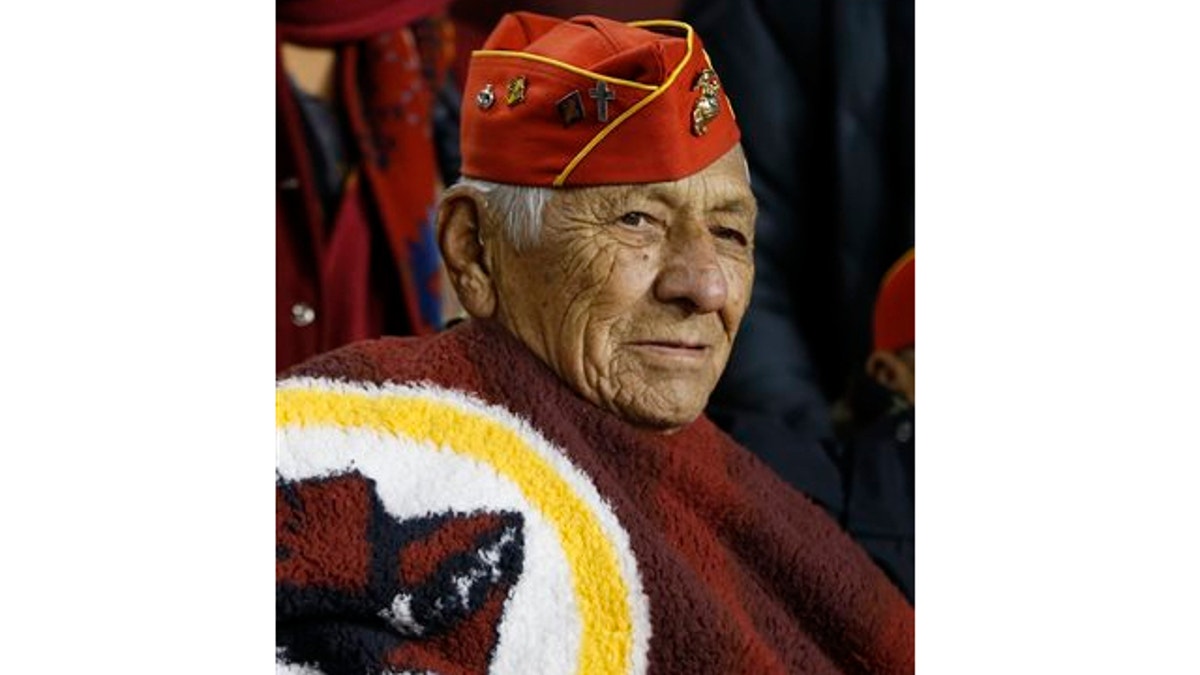
Nov. 25, 2013: Roy Hawthorne, a member of the famed Navajo Nation Code Talkers, watches a football game between the Washington Redskins and San Francisco 49ers in Landover, Md. (AP)
A leader of the Navajo Code Talkers who appeared at a Washington Redskins home football game said Wednesday the team name is a symbol of loyalty and courage -- not a slur as asserted by critics who want it changed.
Roy Hawthorne, 87, of Lupton, Ariz., was one of four Code Talkers honored for their service in World War II during the Monday night game against the San Francisco 49ers.
Hawthorne, vice president of the Navajo Code Talkers Association, said the group's trip was paid for by the Redskins. The four men met briefly with team owner Dan Snyder but did not discuss the name, Hawthorne said.
Still, he said he would endorse the name if asked, and the televised appearance in which three of the Indians wore Redskins jackets spoke for itself.
"We didn't have that in mind but that is undoubtedly what we did do," Hawthorne said when asked if he was intending to send a statement with the appearance. "My opinion is that's a name that not only the team should keep, but that's a name that's American."
Monday night's brief, on-field ceremony came as some Indians and civil rights leaders wage a "Change the Mascot" campaign that targets the term redskins as a racial epithet.
The Navajos' appearance drew heated comments from both sides on social media, including assertions that the Code Talkers were being used as props in a public relations stunt meant to deflect criticism over the name.
Jacqueline Pata, head of the National Congress of American Indians, called the appearance "a political play rather than a heartfelt recognition of the Code Talkers."
Pata, a member of the Tlingit Tribe of Alaska, said she reveres the Code Talkers for the work they have done but added that people often fail to recognize that the origins of the term redskin date to a period when Indians faced efforts to annihilate their culture.
"We were outlawed during that same period the mascot was created from practicing our own religion and our own cultures," she said. "That term is associated with getting rid of the Indians."
Snyder has called the team name and mascot a "badge of honor." The name dates to the team's first years in Boston in the 1930s, and has survived numerous outside efforts to change it. The team has been in the Washington, D.C., area since 1937.
Tony Wyllie, Redskins senior vice president said there was no truth to suggestions that the Code Talkers were used to bolster the team's resistance to a new name.
"They're American heroes, and they deserved recognition," he said.
Also attending Monday's game were Code Talker president Peter MacDonald Sr., George Willie Sr. and George James Sr.
The Navajo Code Talkers used codes derived from their native language to shield military communications from interception by Japanese troops. Hawthorne said there are now about 30 surviving Code Talkers.
The trip to Washington was the second this month for Hawthorne, who last week joined other Code Talkers to receive Congressional Gold Medals for the role they played in World War I and World War II.
The Navajo are perhaps the best known of the Code Talkers, but the Defense Department says the program began in 1918 and at its peak included more than 400 Indians who used 33 dialects to make their codes indecipherable.




















